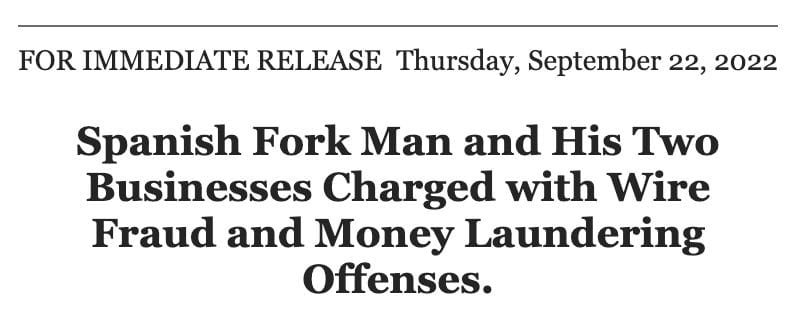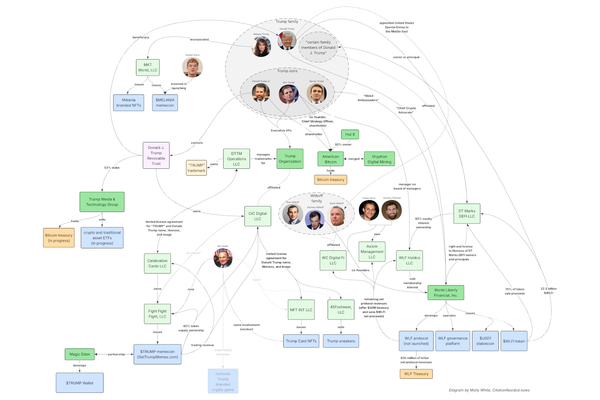Issue 5 – For thousands of years men dreamed of pacts with demons
The $160 million Wintermute hack, the fall of a young Crypto King, and the (possible) destruction of priceless art

Happy October! For those of you who share my hemisphere, I hope your weather is crisp and your lattes are properly spiced.
Coming up
As promised, I've published the lecture I gave on "Blockchain Solutionism" at the University of Texas at Austin. This was for a design class called "Anti-Solutionism", which is a course that should probably be taught at every college. There are chapters marked in this video for those who want to skip the roughly ten-minute-long overview of basic crypto and blockchain topics at the beginning. There will be a transcript of this coming shortly™, as soon as I finish editing the auto-generated captions to remove all my "um"s.
Rebecca Giblin and Cory Doctorow are doing some events surrounding the release of their latest book, Chokepoint Capitalism. I'll be virtually attending one such event at the Berkman Klein Center, which appears to be open to the public.
In the news
It's certainly interesting how many researchers and journalists I stumble across in the crypto world who I already know from their work on political extremism. Jared Holt is one of them. Because his podcast is not specifically crypto- or tech-focused, this is a good one for people who might not already be deeply familiar with the crypto space and all its jargon.
Taylor Locke details the Ethereum Merge: what changed, and what didn't. I mention that even if companies are more willing to use Ethereum now that they won't face as much criticism for the climate impact, they'll still have to grapple with the slowness and transaction fees.
The crypto overview
A straggler from last newsletter: The White House published reports from various departments on September 16, which were prepared in response to President Biden's March Executive Order on digital assets. The accompanying fact sheet began by saying that "Digital assets present potential opportunities to reinforce U.S. leadership in the global financial system and remain at the technological frontier. But they also pose real risks as evidenced by recent events in crypto markets. The May crash of a so-called stablecoin and the subsequent wave of insolvencies wiped out over $600 billion of investor and consumer funds." The reports follow:
- Department of Commerce: "Responsible Advancement of U.S. Competitiveness in Digital Assets" report
- Department of Justice: "The Role of Law Enforcement in Detecting, Investigating, and Prosecuting Criminal Activity Related to Digital Assets" report, press release
- Department of the Treasury: "Action Plan to Address Illicit Financing Risks of Digital Assets" report, fact sheet
- Department of the Treasury: "The Future of Money and Payments" report
- Department of the Treasury: "Implications for Consumers, Investors, and Businesses" report
- Office of Science and Technology Policy: "Technical Evaluation for a U.S. Central Bank Digital Currency System" report, press release
The wave of crypto executives stepping down from their roles is continuing, after Genesis' CEO left the company and Michael Saylor gave up his CEO title (but stayed on as chairman) in August. Now, Genesis' managing director has stepped down after five years; Kraken CEO Jesse Powell relinquished his title, planning to remain at the firm as a chairman; Alex Mashinsky has resigned as the CEO of Celsius Network in the midst of bankruptcy proceedings; and FTX US president Brett Harrison will also be stepping down.
The Cardano blockchain has moved forward with its major "Vasil" hard fork after a bumpy road. A hard fork means that the blockchain is undergoing a fundamental code change, which requires "forking" off a completely new blockchain and then (hopefully) getting everyone to migrate over to it. Cardano is aiming to do this fork in order to improve the network's performance, and improve its smart contract capabilities. However, this major change has been delayed several times, and in August a Cardano developer described the code as "catastrophically broken" despite being described as "tested and ready" for the fork. Cardano founder Charles Hoskinson earned some scorn for his response to the concerns over code issues, where he dismissed them, described the voicing of these concerns as "incredibly corrosive and damaging", and urged pushing forward despite them. Hoskinson later apologized, saying that he was frustrated, sad, and angry after seeing YouTube videos discussing Cardano's "testnet catastrophe".
The Web3 is Going Just Great recap
Note: If you're a dutiful follower of the W3IGG site and don't need a recap, you can scroll on past to the "Week in review" section.
There were 17 new entries between September 20 and October 2, averaging 1.3 posts a day.
For thousands of years men dreamed of pacts with demons
[link]
An algorithmic market maker called Wintermute (after the cold and calculating AI in William Gibson's Neuromancer) suffered a $160 million hack on September 20. The exploit traced back to the vulnerability in the vanity wallet address generator, Profanity, that had been publicized five days prior. Despite the massive loss, the Wintermute team tried to reassure its users that the company was still "solvent with twice over that amount in equity left".
$160 million puts Wintermute on the (as-yet-still imaginary) W3IGG leaderboard for largest hacks by monetary value. For those who prefer real leaderboards, Rekt has one that puts the incident in seventh place. This is the second major SNAFU for Wintermute, who earlier this year provided the Optimism project with the wrong crypto wallet address, causing them to send 20 million $OP tokens to the wrong place. These were snapped up by a watchful observer, though that person did ultimately return 17 million of the tokens, keeping some as a "bounty". Wintermute wound up reimbursing Optimism for the rest.
Investors learn that the 23-year-old "Crypto King" maybe didn't have their best interests in mind
[link]
As bankruptcy proceedings and several lawsuits are underway, investors are hoping they might see some of the more than $35 million they collectively entrusted to the now 23-year-old self-described "Crypto King". Investigators are working to untangle Pleterski's operation, a chaotic affair thanks to Pleterski's apparent lack of record-keeping. So far, the court has seized two McLarens, two BMWs, and a Lamborghini, only five of the fifteen luxury cars Pleterski owned or rented. Pleterski promised his creditors that he would earn them 10–20% gains biweekly, but he said that he lost most of the money "in a series of margin calls and bad trades" in late 2021 and early 2022.
The CFTC sues a DAO
[link]
In what promises to be an interesting case to track, the U.S. Commodity Futures Trading Commission has filed suit against the Ooki DAO for allowing illegal trading of digital assets, engaging in activities only allowed by registered futures commission merchants, and not performing proper KYC. The lawsuit notes that Ooki DAO had been formed for the express purpose of evading regulators, quoting the founder: "what we're going to do is take all the steps possible to make sure that when regulators ask us to comply, that we have nothing we can really do because we've given it all to the community".
The thing about DAOs is they often don't provide their members with the kinds of protections offered by more traditional organizations, unless the DAO is also registered as an LLC or something similar. Because the Ooki DAO is an "unincorporated association", its individual members risk being held liable for the DAO's actions.
Businessman claims to have burned an original Frida Kahlo drawing to bring attention to his NFT project
[link]
A Mexican businessman published a YouTube video titled "Burning of a $10M Frida Kahlo Painting", in which the attendees at his fancy event cheered as he lit on fire what he claimed was a $10 million original Frida Kahlo drawing. He claimed that the burning would "transition [the artwork] into the Metaverse", where he is selling 10,000 NFTs linked to the artwork, for 3 ETH (~$4,000) apiece, which would net him $40 million in mint fees if the collection were to sell out. However, only two NFTs have been minted so far by outside parties, for a total of 7 ETH ($9,400)—meaning the businessman hasn't quite broken even on his claimed $10 million purchase. Fortunately for pretty much everyone other than the clapping party attendees, who are rightfully horrified at the stunt, there are some serious questions about whether the burned piece of artwork was authentic.
Everything else
- Coinbase experiences major outage related to U.S. bank accounts [link]
- Transit Swap hacked for $21 million, hacker returns large portion [link]
- NFT trading fantasy league emerges to provide traders with the "sweet adrenaline" of flipping NFTs that they're missing in the bear market [link]
- One misconfigured node apparently takes the entire Solana network offline [link]
- Elon Musk's texts reveal his ideas for a blockchain-based Twitter [link]
- MEV bot earns over $1 million in profit, loses almost $1.5 million in hack an hour later [link]
- Crypto executive exodus continues [link]
- Eight state regulators file enforcement actions against Nexo [link]
- Four NFTs valued at at least $150,000 stolen from Jason Falovitch [link]
- IRS gets permission for summons to go after taxpayers who didn't report crypto transactions [link]
- Man charged with seven felonies over crypto scams [link]
- Compute North, one of the largest crypto mining datacenters, files for bankruptcy [link]
- Wall Street Journal suggests that Coinbase tested proprietary trading [link]
Week in review
It's been a busy week, but mostly in my offline life. I got my updated COVID booster and flu shot, a combo that worried me as far as side effects but turned out to be pretty painless. I was a bit fatigued the next day, but spent it fairly enjoyably: relaxing with Atlas while I finished reading James Muldoon's Platform Socialism.

Worth a read
Protos describes the lawsuit by Ben "BitBoy Crypto" Armstrong against a YouTuber who called him a "dirtbag influencer", as well as the general topic of crypto influencers, their malfeasance, and the threats they sometimes level at people who report on their bad actions.
Some solid reporting out of Forbes on Helium's continued fall from grace. Once the go-to example by crypto folks for a web3 project that was actually useful, it's now coming out that—like many crypto projects—it hasn't actually done much aside from lure in regular people hoping to earn passive income, and enrich its founders and other insiders. This follows reporting from this summer, when it was revealed by Matt Binder in Mashable that Helium had been lying about its corporate users.
Did you know…
In 1985, Microsoft developed a Mac peripheral called the MacEnhancer. Built for the first two models of the Compact Macintosh, it provided printer and serial ports that allowed them to communicate with otherwise unsupported printers. Microsoft sold the rights to the MacEnhancer the following year, and left the Mac peripherals market for good.
Now you know!
That's all for now folks. Until next time,
– Molly




